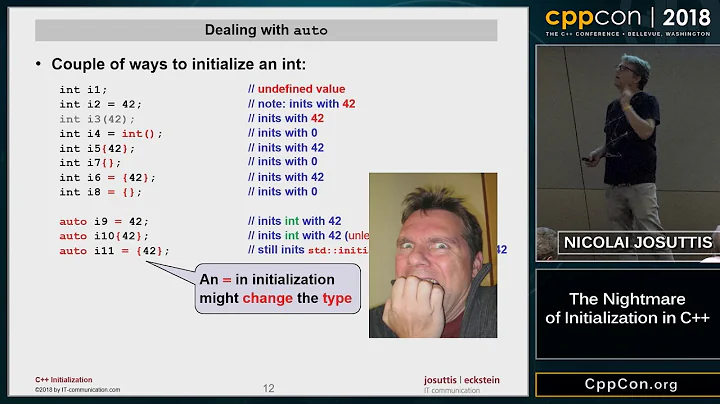initialization with '{...}' expected for aggregate object
When you declare a variable Element allBars [] the compiler does expect a list of values like { Element("Bar"), Element("Foo") }. This is a static array whose size is known at compile time. So for example:
Element allBars [] = { Element("Bar"), Element("Foo") };
(Beware some compiler do require the number of element to be specified in the []).
If you want to declare a dynamic array, either you use a std::vector<Element> allBars;, which I would strongly recommend, because it cause grow and shrink without you worrying for memory allocation and deallocation. Your class should have a default constructor, a copy constructor and an assignment operator (even if generated by the compiler).
Or you use a pointer that you fill with new Element[xxx] like Element* allBars = new Element[size_of_array];, that cannot grow nor shrink and that you will have to explicitly delete using delete[] in order to call the Element destructor for every element of your array.
In both case, each Elementof the array will be initialized using the default constructor.
Related videos on Youtube
Sarah
Previous Neuroscience student now CompSci student. Trying my best, but making too many stupid mistakes.
Updated on June 17, 2022Comments
-
 Sarah almost 2 years
Sarah almost 2 yearsI am trying to do string parsing (and it is proving to be a huge pain). I'm getting this error: "initialization with '{...}' expected for aggregate object "
I have an element defined like this:
Element * currentBar = new Element("Bar");I want to make an array or something to store multiple bars, so I am trying to do something like this:
Element allBars [] = new Element("Bars");I am pretty sure this is not what I want to do, especially since I am getting this error "initialization with '{...}' expected for aggregate object "
This is a segment of my code:
if(!chartDataString.empty()){ chartData.clear(); int index = 0; char c, c1, c2; inputMode currentInputMode = inputMode::UNKNOWN; Element * cur = NULL; while(index<chartDataString.size()){ c = chartDataString[index]; c1 = chartDataString[index+1]; c2 = chartDataString[index+2]; string s; s = c1; Element * currentBar = new Element("Bar"); Element allBars [] = new Element("Bars"); if(c == '*'){ if(c1 == 'i'){ currentBar->addChild(Element("rehearsalLetter", "info")); } else{ currentBar->addChild(Element("leftDoubleBarLine", s)); index++; } else if(c == '['){ currentBar->addChild(Element("leftDoubleBarLine")); } else if(c == 'T'){ string signature = string() + c1 + '/' + c2; currentBar->addChild(Element("timeSignature", signature)); index += 2; } //start a new bar else if(c == '|'){ allBars->addChild(currentBar); currentBar = new Element("bar"); }And my element class just in case it's helpful:
#include <string> #include <ostream> #include "ArrayList.h" class Element{ public: Element(){} Element( const string& _title ){ title = _title; } Element( const string& _title, const string& _value){ title = _title; value = _value; }; ~Element(){}; void addChild(Element & child){ children.add(child); } void serialize(ostream & o ){ if( children.size() == 0 ){ o << "<" << title << ">"; o << " " << value << " "; o << "</" << title << ">"; }else{ o << "<" << title << ">" << endl; for( int i = 0; i < children.size(); ++i ){ children.elementAt(i).serialize(o); } o << "</" << title << ">" << endl; } } private: string title; string value; ArrayList<Element> children; };-
Kerrek SB over 10 yearsTry
std::vector<Element>. Dynamic arrays are a wart and a cancer that doesn't fit into the language. There are multiple defect reports open concerning dynamic arrays.
-
-
 Sarah over 10 yearsI have an array list class, it is possible just to make an array list of the bars?
Sarah over 10 yearsI have an array list class, it is possible just to make an array list of the bars? -
 Lightness Races in Orbit over 10 years
Lightness Races in Orbit over 10 years(Beware some compiler do require the number of element to be specified in the []).For example? Such compilers would be non-conformant. -
Johan over 10 yearsAs I do not see the ArrayList code, I do not know :) But
vectoris great. Hard to beat in term of safety and performance for an array. The only problem is when you have a huge number of value that you can afford to store contiguously. -
 Lightness Races in Orbit over 10 years@Johan: That's when you switch to
Lightness Races in Orbit over 10 years@Johan: That's when you switch tostd::deque -
 Sarah over 10 yearsWill doing this allow me to call addChild on allBars?
Sarah over 10 yearsWill doing this allow me to call addChild on allBars? -
Johan over 10 years@LightnessRacesinOrbit Yep, good advice ;) And for the compiler, I think it is just an old version of a compiler that rise an error in one previous question. Have to check what it was.
-
Johan over 10 years@Sarah
for (auto& elem: allBars) { elem.addChild(the_child); }if that suits you







